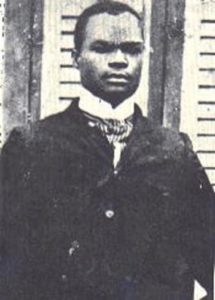
Slyvester williams
*Sylvester Williams was born on this date in 1869. He was a Black activist, lawyer, and politician.
One of five children, Henry Sylvester Williams, was born in Trinidad. His father was a wheelwright who had initially come from Barbados. A talented student, young Williams qualified as a schoolteacher in 1886 and became a principal two years later. He was interested in politics and, in 1890, helped establish the Trinidad Elementary Teachers Union. Williams moved to New York to work as a shoe shiner one year later. Later, he studied law at Dalhousie University in Nova Scotia but left before graduating.
In 1896, he entered King's College in England. To help pay for his education, Williams lectured for the Church of England Temperance Society and the National Thrift Society. While in London, Williams met and married Agnes Powell, a member of the Temperance Society, though her father, Captain Francis Powell, objected to the wedding. Over the next few years, the couple had five children.
In 1897, Williams established the African Association. The following year, he issued a statement calling for a conference "to take steps to influence public opinion on existing proceedings and conditions affecting the welfare of the natives in the various parts of the Empire, v. South Africa, West Africa, and the British West Indies."
After meeting with Booker T. Washington, he increased the scope of the conference by also looking at "the treatment of native races under European and American rule." The Pan-African Conference was held at Westminster Town Hall in July 1900. There were 37 delegates from Europe, Africa, and the United States. Those attending included Samuel Coleridge Taylor, John Alcindor, Dadabhai Naoroji, John Archer, and W. E. B. Du Bois.
After the conference, the Pan-African Congress wrote to the British colonial secretary Joseph Chamberlain, suggesting that Black people in the British Empire should be granted "true civil and political rights." Chamberlain replied that Black people were "totally unfit for representative institutions." Williams responded by writing to Queen Victoria about the system "whereby black men, women, and children were placed in legalized bondage to white colonists."
The letter was passed to Chamberlain, who replied that the government would not "overlook the interests and welfare of the native races." In 1901, Williams traveled globally and managed to set up branches of the Pan-African Congress in America, Jamaica, and Trinidad and established the journal The Pan African. Membership of the Pan-African Congress remained small; it only had 50 working members in 1901. One hundred fifty white sympathizers were admitted to the organization as honorary members. Williams passed the bar exam in June 1902 and became the first barrister (lawyer) of African descent to practice in Britain. Over the next few years, he defended Blacks in the campaign against racial prejudice in South Africa. He also spent time in Liberia, Guinea, and Sierra Leone.
Williams joined the Fabian Society, and in November 1906, he and John Archer became the first people of African descent to be elected to public office in Britain. Williams won a seat on Marylebone Borough Council, and Archer won in Battersea. 1908, Williams returned to Trinidad with his family and built a successful legal practice in Port of Spain until his death on March 26, 1911.
Henry Sylvester Williams and origins of Organizational Pan-Africanism: 1897-1902.
by Clarence G. Contee
Washington D.C.: Howard University Press, 1973.
Henry Sylvester Williams: Imperial Pan-Africanist.
by J.R. Hooker
London: Rex Collings Ltd, 1975.